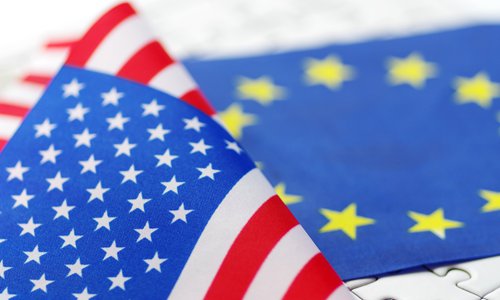HOME >> OPINION
US-Europe relations struggle as unilateralist diplomacy thwarts progress
By Sun Chenghao Source:Global Times Published: 2019/7/17 21:45:57

Photo: IC
US-Europe relations have taken another turn for the worse. Kim Darroch resigned on July 10 as the British ambassador to the US, because of leaked documents in which he said US President Donald Trump and his administration are "inept" and "dysfunctional." On the same day, Washington announced it would launch a Section 301 investigation into France's digital tax service.
Since Trump took office, a constant rift between the US and Europe on specific issues remain evident, affecting the foundation of their alliance. Europe worried about not only being abandoned by the US but also being drawn into conflicts it cannot afford.
Within the context of US-Europe ties, a new dilemma is not limited to Europe's fear of being involved in US-led skirmishes, but is embodied in four pairs of contradictions, namely the collisions between "America First" and "European integration," swinging sentiment between security reliance and strategic independence, the dilemma between competitors and economic partners, and rivalry over unilateralism and multilateralism.
Different from the 2003 Iraq invasion, what Europe is worried about has nothing to do with the US abusing regional hegemony, but the contradictions that arise from egoism. Since the end of World War II, the US has advocated European integration.
The US needs a stable, democratic, and prosperous Europe as an anchor for US-led international order. Washington's support for European integration guarantees transatlantic stability. However, the consensus is encountering challenges on both sides.
Without taking into account Europe's ideas and history, the Trump administration understands European integration merely from the perspective of economic benefit. It does not like the EU's low efficiency, and thinks the EU was formed to beat the US on trade and is a vehicle for Germany. Trump upholds Brexit and indirectly encourages European populists, which contradicts Europe that remains connected to free trade and globalization.
In the security domain, NATO is the core of transatlantic relations and the most important link in the US-EU alliance. Europe depends on NATO. Washington has increased investments in European security through its support of the European Deterrence Initiative and deepening military cooperation with Central and Eastern European countries, like Poland.
However, the Trump administration repeatedly links security with the economy, pressuring European allies to boost NATO military spending. Europe has enhanced its necessity for strategic independence and taken actions such as launching the Permanent Structured Cooperation and establishing the European Defense Fund.
However, it will be challenging for Europe to avoid US overreaction and maintain alliances.
In the sphere of economy and trade, the US has utilized robust diplomacy to achieve European concessions, repeatedly piling up pressure through new tariffs. Meanwhile, Europe is reluctant to damage cooperation efforts with China and Russia. Washington hopes Europe will make efforts in geopolitics by suppressing both Beijing and Moscow, while Europe is not willing to get involved in the competition between great powers.
With multilateral diplomacy and global governance, US unilateralism and European multilateralism is tit-for-tat. Washington has disregarded the interests of Europe, declaring to quit the Iranian nuclear deal and threatening to impose sanctions on European firms that trade with Iran.
Europe doesn't want the Iran nuclear deal to collapse, nor does it intend to blame Washington. Silent resentment best describes the condition of US-Europe ties. Furthermore, Europe and the US have a remarkable divergence on global governance issues such as climate change.
Although Europe and the US still believe that the benefits of their alliance outweigh the drawbacks, the common threat that once untied them no longer exists, and their shared benefits and values have since changed. If Europe and the US fail to accommodate one another, their relationship could diminish further.
The author is an assistant research fellow with the Institute of American Studies of the China Institutes of Contemporary International Relations. opinion@globaltimes.com.cn
Posted in: VIEWPOINT